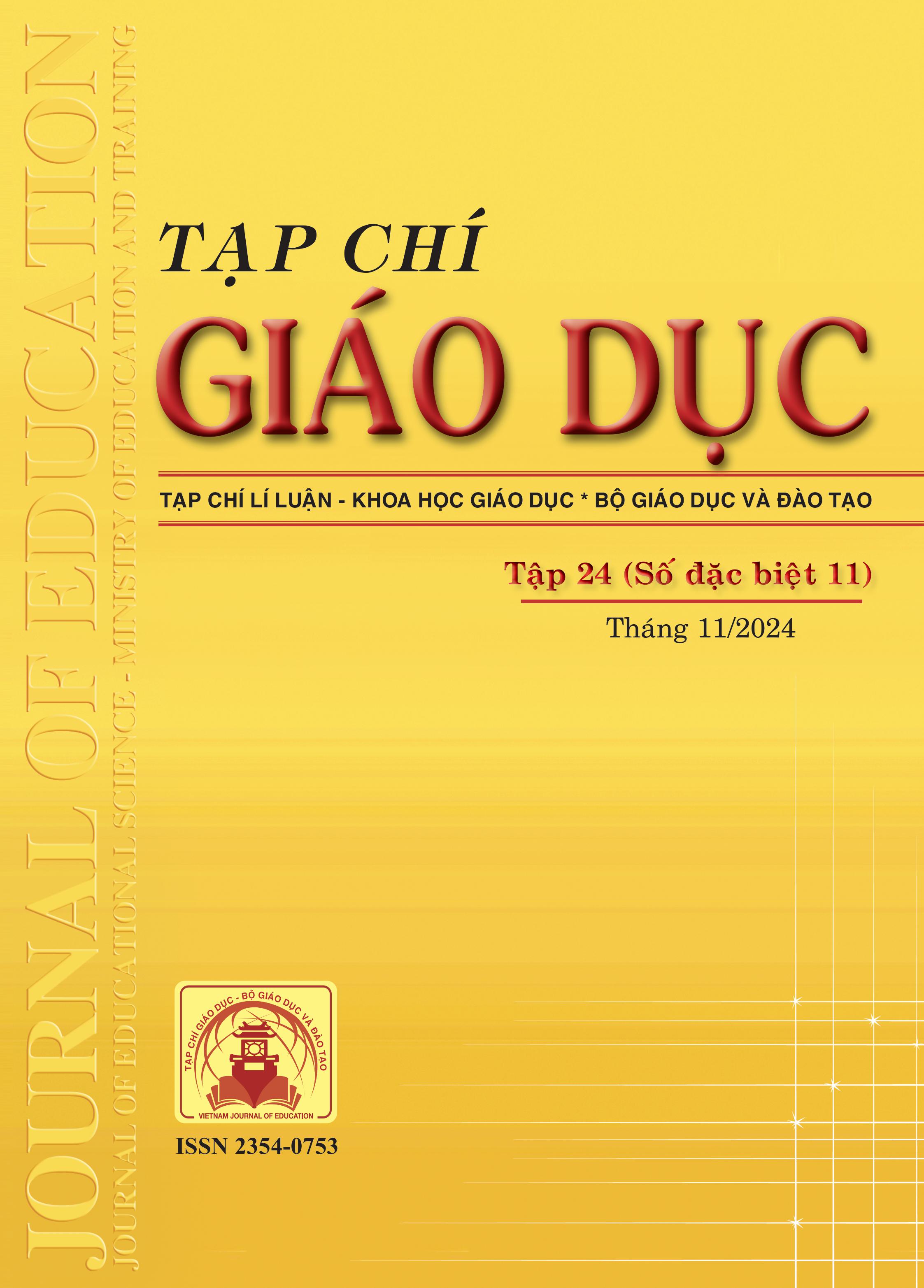Đề xuất thang đo năng lực đánh giá lớp học cho sinh viên sư phạm đáp ứng đổi mới kiểm tra đánh giá của Việt Nam hiện nay
Tóm tắt
Classroom assessment is always evolving alongside the development of the teaching environment and tools. Therefore, the competency of classroom assessment must adapt to these changes and grasp them to adjust the training process, which is a crucial task. The literature review results indicate that there is no specific scale for assessing pedagogy students; the current classroom assessment standards are insufficient to fully measure assessment competencies. This study proposes a comprehensive scale based on four main pillars: knowledge, practice, digital assessment competency, and ethics. The proposed scale has been tested with high reliability. Experimental results show that the scale is suitable for assessment and reveals the latent competencies each student possesses. These are important foundations for developing classroom assessment competency in the current context.
Tài liệu tham khảo
AEA-Europe (2012). European framework of standards for educational assessment 1.0. In. Rome: Edizioni Nuova Cultura: Association for Educational Assessment-Europe.
AFT, NCME, & NEA (1990). Standards for Teacher Competency in Educational Assessment of Students. In. Washington, DC American Federation of Teachers, National Council on Measurement in Education & National Education Association: National Council on Measurement in Education. Akbar, H. M., & Biyanto, B. (2022). The Role of Digital Competence for Pre-Service Teachers in Higher Education Indonesia. AL-ISHLAH: Jurnal Pendidikan, 14(1), 233-240.
Australia.Dept.of.Education. (2012). Australian Professional Standards for Teachers. In. Australia Dept. of Education.
Barnes, N., Gareis, C., DeLuca, C., Coombs, A., & Uchiyama, K. (2020). Exploring the roles of coursework and field experience in teacher candidates' assessment literacy: A focus on approaches to assessment. Assessment Matters, 14, 5-41. https://doi.org/https://doi.org/10.18296/am.0045
Campbell, C., Murphy, J. A., & Holt, J. K. (2002). Psychometric analysis of an assessment literacy instrument: Applicability to preservice teachers (In Annual meeting of the mid-western educational research association, Issue.
DeLuca, C., LaPointe-McEwan, D., & Luhanga, U. (2016). Approaches to Classroom Assessment Inventory: A New Instrument to Support Teacher Assessment Literacy. Educational Assessment, 21(4), 248-266. https://doi.org/10.1080/10627197.2016.1236677
Gardner, J., Harlen, W., Hayward, L., & Stobart, G. (2008). Changing Assessment Practice: Process, Principles and Standards. . https://www.nuffieldfoundation.org/project/analysis-and-review-of-innovations-in-assessment-aria. www.assessment-reform-group.org
Hoang, L. P., Le, H. T., Tran, H. V., Phan, T. C., Vo, D. M., Le, P. A.,…Pong-inwong, C. (2022). Does Evaluating Peer Assessment Accuracy and Taking It into Account in Calculating Assessor’s Final Score Enhance Online Peer Assessment Quality? Education and Information Technologies, 27, 4007-4035. https://doi.org/https://doi.org/10.1007/s10639-021-10763-1
Hoang, L. P., Le, P. A., Arch-int, S., & Arch-Int, N. (2020). Multidimensional Assessment of Open-Ended Questions for Enhancing the Quality of Peer Assessment in E-Learning Environments. In P. Hershey (Ed.), Management Association (Ed.), Learning and Performance Assessment: Concepts, Methodologies, Tools, and Applications (Vol. 1, pp. 147-173). IGI Global. https://doi.org/10.4018/978-1-7998-0420-8.ch008
Klinger, D. A., McDivitt, P. R., Howard, B. B., Munoz, M. A., Rogers, W. T., & Wylie, E. C. (2015). The Classroom Assessment Standards for PreK-12 Teachers. https://evaluationstandards.org/classroom/
Koehler, M. J., & Mishra, P. (2016). Handbook of Technological Pedagogical Content Knowledge (TPACK) for Educators. Routledge. https://doi.org/10.4324/9781315771328
Leong, W. S. (2015). Teachers’ assessment literacies and practices: developing a professional competency and learning framework. Advances in Scholarship of Teaching and Learning, 2(2).
Loureiro, P., & Gomes, M. J. (2023). Online peer assessment for learning: findings from higher education students. Education Sciences, 13(3), 253. https://doi.org/10.3390/educsci13030253
Nayagi, N. K., & Rajendran, M. (2020). Pre-service teachers’ approaches to classroom assessment. Humanities & Social Sciences Reviews, 8(1), 666-673. https://doi.org/10.18510/hssr.2020.8180
NZTC (2008). Graduating teacher standards. Retrieved September, 27 from https://traintheteacher.me/graduating-teacher-standards-e-portfolio/new-zealand-graduating-teacher-standards/
Ogan-Bekiroglu, F., & Suzuk, E. (2014). Pre-service teachers’ assessment literacy and its implementation into practice. The Curriculum Journal, 25(3), 29. https://doi.org/https://doi.org/10.1080/09585176.2014.899916
Peled, Y. (2021). Pre-service teacher’s self-perception of digital literacy: The case of Israel. Education and Information Technologies, 26, 2879-2896. https://doi.org/10.1007/s10639-020-10387-x
Plake, B. S. (1993). Teacher assessment literacy: Teachers' competencies in the educational assessment of students. Mid-Western Educational Researcher, 6(1), 21-27.
Tran, H. V., Le, H. T., Phan, T. C., Hoang, L. P., & Phan, T. M. (2022). Flipped classroom in online teaching: a high school experience, Interactive Learning Environments. Interactive Learning Environments. https://doi.org/10.1080/10494820.2022.2120020
Tran, H. V., Phan, T. C., Le, H. T., Hoang, L. P., Phan, T. M., & Thai, H. T. (2021). A Systematic Style-Based Blended Teaching for Competence Enhancement of Lecturers in the COVID-19 Pandemic Situation: A Case Study for Teaching in Higher Education. Turkish Journal of Computer and Mathematics Education, 12(12 (2021)), 3871-3884. https://doi.org/10.16949/turkbilmat.702540
UNESCO (2018). UNESCO IT Competency Framework for Teachers. France.
White, E. (2019). Developing Assessment literacy Through Assessing Classroom Tests: Instruments and Procedures. In T. D. Eddy White (Ed.), Handbook of Research on Assessment Literacy and Teacher-Made Testing in the Language Classroom (Advances in Educational Technologies and Instructional Design (AETID)) (pp. 26). IGI Global. https://doi.org/10.4018/978-1-5225-6986-2.ch002
Đã Xuất bản
Cách trích dẫn
Số
Chuyên mục
Giấy phép

Tác phẩm này được cấp phép theo Ghi nhận tác giả của Creative Commons Giấy phép quốc tế 4.0 .












